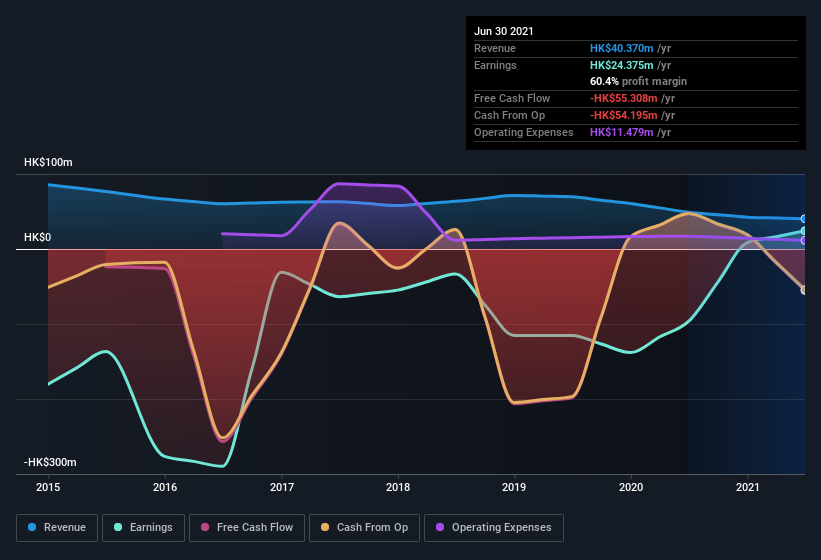- Hong Kong
- /
- Oil and Gas
- /
- SEHK:689
EPI (Holdings)'s (HKG:689) Robust Profit May Be Overstating Its True Earnings Potential
Shareholders were pleased with the recent earnings report from EPI (Holdings) Limited (HKG:689). Despite this, we feel that there are some reasons to be cautious with these earnings.
See our latest analysis for EPI (Holdings)

Zooming In On EPI (Holdings)'s Earnings
Many investors haven't heard of the accrual ratio from cashflow, but it is actually a useful measure of how well a company's profit is backed up by free cash flow (FCF) during a given period. In plain english, this ratio subtracts FCF from net profit, and divides that number by the company's average operating assets over that period. The ratio shows us how much a company's profit exceeds its FCF.
That means a negative accrual ratio is a good thing, because it shows that the company is bringing in more free cash flow than its profit would suggest. While it's not a problem to have a positive accrual ratio, indicating a certain level of non-cash profits, a high accrual ratio is arguably a bad thing, because it indicates paper profits are not matched by cash flow. That's because some academic studies have suggested that high accruals ratios tend to lead to lower profit or less profit growth.
EPI (Holdings) has an accrual ratio of 0.30 for the year to June 2021. Therefore, we know that it's free cashflow was significantly lower than its statutory profit, raising questions about how useful that profit figure really is. Even though it reported a profit of HK$24.4m, a look at free cash flow indicates it actually burnt through HK$55m in the last year. We saw that FCF was HK$47m a year ago though, so EPI (Holdings) has at least been able to generate positive FCF in the past. Having said that, there is more to the story. We can see that unusual items have impacted its statutory profit, and therefore the accrual ratio. One positive for EPI (Holdings) shareholders is that it's accrual ratio was significantly better last year, providing reason to believe that it may return to stronger cash conversion in the future. Shareholders should look for improved cashflow relative to profit in the current year, if that is indeed the case.
Note: we always recommend investors check balance sheet strength. Click here to be taken to our balance sheet analysis of EPI (Holdings).
How Do Unusual Items Influence Profit?
As it happens, there are a few different things to consider when we look at EPI (Holdings)'s profit and the last one we'll mention is HK$17m gain booked as unusual items. We can't deny that higher profits generally leave us optimistic, but we'd prefer it if the profit were to be sustainable. We ran the numbers on most publicly listed companies worldwide, and it's very common for unusual items to be once-off in nature. And that's as you'd expect, given these boosts are described as 'unusual'. We can see that EPI (Holdings)'s positive unusual items were quite significant relative to its profit in the year to June 2021. All else being equal, this would likely have the effect of making the statutory profit a poor guide to underlying earnings power.
Our Take On EPI (Holdings)'s Profit Performance
Summing up, EPI (Holdings) received a nice boost to profit from unusual items, but could not match its paper profit with free cash flow. For the reasons mentioned above, we think that a perfunctory glance at EPI (Holdings)'s statutory profits might make it look better than it really is on an underlying level. If you want to do dive deeper into EPI (Holdings), you'd also look into what risks it is currently facing. For instance, we've identified 3 warning signs for EPI (Holdings) (1 is concerning) you should be familiar with.
Our examination of EPI (Holdings) has focussed on certain factors that can make its earnings look better than they are. And, on that basis, we are somewhat skeptical. But there is always more to discover if you are capable of focussing your mind on minutiae. For example, many people consider a high return on equity as an indication of favorable business economics, while others like to 'follow the money' and search out stocks that insiders are buying. While it might take a little research on your behalf, you may find this free collection of companies boasting high return on equity, or this list of stocks that insiders are buying to be useful.
Valuation is complex, but we're here to simplify it.
Discover if EPI (Holdings) might be undervalued or overvalued with our detailed analysis, featuring fair value estimates, potential risks, dividends, insider trades, and its financial condition.
Access Free AnalysisThis article by Simply Wall St is general in nature. We provide commentary based on historical data and analyst forecasts only using an unbiased methodology and our articles are not intended to be financial advice. It does not constitute a recommendation to buy or sell any stock, and does not take account of your objectives, or your financial situation. We aim to bring you long-term focused analysis driven by fundamental data. Note that our analysis may not factor in the latest price-sensitive company announcements or qualitative material. Simply Wall St has no position in any stocks mentioned.
Have feedback on this article? Concerned about the content? Get in touch with us directly. Alternatively, email editorial-team (at) simplywallst.com.
About SEHK:689
EPI (Holdings)
An investment holding company, primarily engages in the exploration and production of petroleum in Canada and Hong Kong.
Flawless balance sheet with solid track record.
Market Insights
Community Narratives



